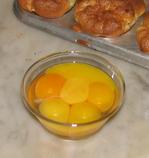|
Anne and Phil Westwood run the Freeranger Eggs farm as a fully sustainable farming enterprise.
There is no need for our hens to be locked up because they are always protected from predators by their personal guard dogs. The hens are fed a natural diet of grains with no colouring additives - and they are not beak trimmed. De-beaking, or beak trimming, is not necessary on a true free range farm. If a farm beak-trims its birds (removing part of the beak) to stop them pecking each other, it's an indication that the farm is not really free range, but is an intensive production system. Hens are gregarious creatures, but they prefer small groups and they tend to become aggressive when too many are confined in small spaces - which is why the big producers always beak trim their hens even though it is contrary to the Model Code except as a last resort. |
|
Channel 10's The Circle looks at the Freeranger eggs farm
Aaron Wood came down to the farm to check out what we do.
Paul Mercurio from Mercurio's Menu also came and we appeared with Des Dowling on Talk to the Animals as well as ABC TV's Landline and several Current Affairs shows.
Paul Mercurio from Mercurio's Menu also came and we appeared with Des Dowling on Talk to the Animals as well as ABC TV's Landline and several Current Affairs shows.
Freeranger Eggs Farm CV
Freeranger Eggs has a comprehensive Quality Assurance and Food Safety Program in place which takes a three pillars approach covering farm sustainability, safe food production (human health) and animal welfare
We encourage customers to look at our website and Facebook page and contact us with any queries.
Registered with DELWP for free range egg production
Hosted many groups including CWA, Friends of the Earth, Women on Farms, Friends of the
Cranbourne Botanic Gardens, Landcare National Conference as well as overseas farm groups.
CEO of the Humane Society International and the Chief Operating Officer of Humane Choice
have visited. The Chief Executive Officer of HSI (Verna Simpson) wrote to us saying "As FRFA does not seem to be continuing as a certification body you are welcome to become a full Humane Choice farm. I know you probably don’t need certification as you sell all the eggs you produce. Your farm is what free range farming is all about and you would obviously have no trouble meeting our audit requirements. It is just a shame that FRFA’s internal issues could not be resolved."
Hosted international business delegations looking at sustainable farming methods
including several from Papua/New Guinea and Europe
Held many open days and workshops to promote sustainable agriculture, the latest being a
workshop as part of Fair Food Week in August 2013
Provides an educational facility for, amongst others, Victorian College for the Deaf,
Leongatha Secondary College
Research property for various tertiary institutions
Showcased on television programs including The Circle, Mercurio's Menu, Talk to the
Animals, The Living Room, Landline
Featured in numerous newspapers, magazines and journals
Encourages and actively assists new entrants to the free range egg industry
Australian national winners of the acclaimed Austrian 2012 Energy Globe International Award for sustainability
Freeranger Eggs was a founding member of the Western Port Biosphere Reserve
Freeranger Eggs maintains a waiting list of potential customers. Our eggs are basically laid to order for distribution in our local area and we simply cannot satisfy additional demand.
We encourage customers to look at our website and Facebook page and contact us with any queries.
Registered with DELWP for free range egg production
Hosted many groups including CWA, Friends of the Earth, Women on Farms, Friends of the
Cranbourne Botanic Gardens, Landcare National Conference as well as overseas farm groups.
CEO of the Humane Society International and the Chief Operating Officer of Humane Choice
have visited. The Chief Executive Officer of HSI (Verna Simpson) wrote to us saying "As FRFA does not seem to be continuing as a certification body you are welcome to become a full Humane Choice farm. I know you probably don’t need certification as you sell all the eggs you produce. Your farm is what free range farming is all about and you would obviously have no trouble meeting our audit requirements. It is just a shame that FRFA’s internal issues could not be resolved."
Hosted international business delegations looking at sustainable farming methods
including several from Papua/New Guinea and Europe
Held many open days and workshops to promote sustainable agriculture, the latest being a
workshop as part of Fair Food Week in August 2013
Provides an educational facility for, amongst others, Victorian College for the Deaf,
Leongatha Secondary College
Research property for various tertiary institutions
Showcased on television programs including The Circle, Mercurio's Menu, Talk to the
Animals, The Living Room, Landline
Featured in numerous newspapers, magazines and journals
Encourages and actively assists new entrants to the free range egg industry
Australian national winners of the acclaimed Austrian 2012 Energy Globe International Award for sustainability
Freeranger Eggs was a founding member of the Western Port Biosphere Reserve
Freeranger Eggs maintains a waiting list of potential customers. Our eggs are basically laid to order for distribution in our local area and we simply cannot satisfy additional demand.

